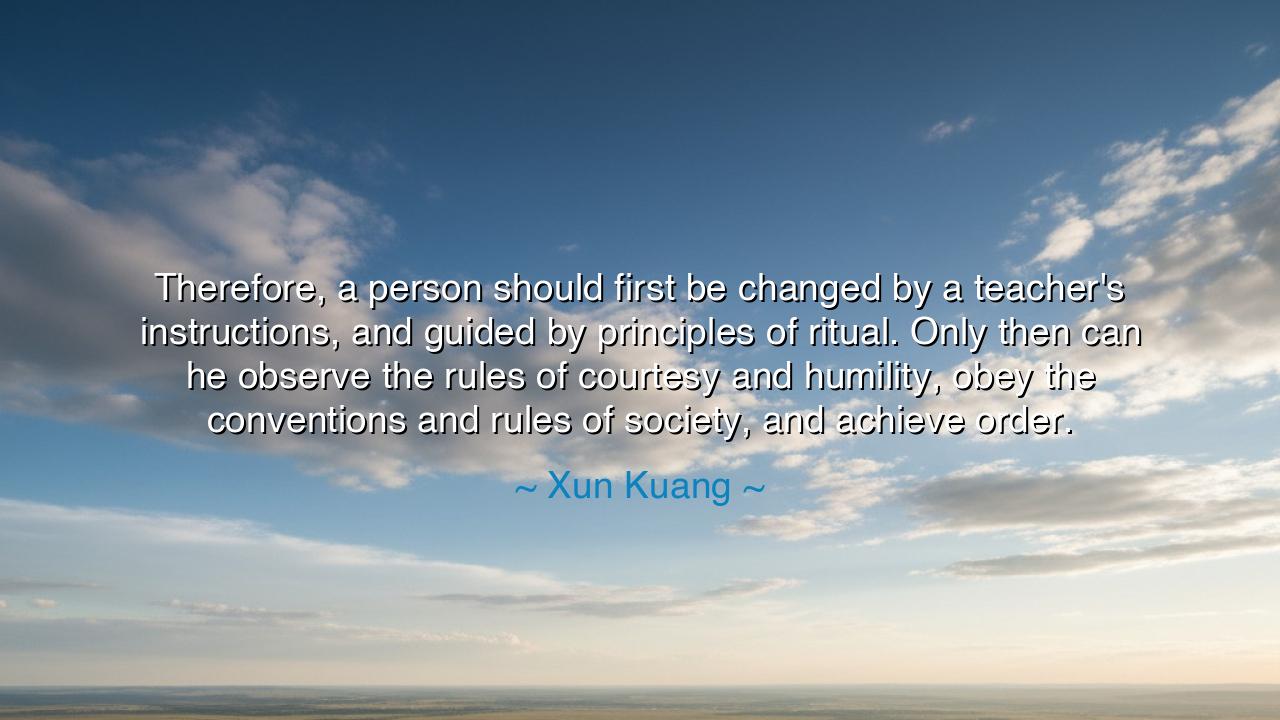
Therefore, a person should first be changed by a teacher's
Therefore, a person should first be changed by a teacher's instructions, and guided by principles of ritual. Only then can he observe the rules of courtesy and humility, obey the conventions and rules of society, and achieve order.






Xun Kuang, known to the ages as Xunzi, one of the great voices of ancient Chinese philosophy, once declared with clarity and depth: “Therefore, a person should first be changed by a teacher’s instructions, and guided by principles of ritual. Only then can he observe the rules of courtesy and humility, obey the conventions and rules of society, and achieve order.” These words, though carved in the stone of antiquity, still burn with relevance today, for they speak to the eternal truth of human nature: that man is not born finished, but must be shaped, trained, and guided toward harmony.
O listener, hear the wisdom of Xunzi. He lived in a time of chaos, when the ancient states of China warred endlessly and society was fractured. He looked upon the world and saw that man, left to his raw desires, could not create peace or justice. Thus he proclaimed that it is the teacher who begins the transformation. For instruction is the seed, planted in the wilderness of the heart, which grows into discipline and virtue. Without instruction, the soul remains untamed, like an uncarved block of wood. With instruction, it takes form and purpose.
Yet instruction alone is not enough. Xunzi points us next to ritual, those patterns of behavior and symbols that bind the individual to the whole. Ritual is more than ceremony; it is the fabric that weaves together respect, self-restraint, and reverence. When a child bows to his elders, when friends exchange greetings with sincerity, when leaders govern with dignity, the society breathes in rhythm. To Xunzi, it was only through ritual that the lessons of the teacher became living habits, and through habits, the heart was elevated above selfishness.
History has shown the truth of his teaching. Consider Japan after the devastation of the Second World War. The nation did not rebuild itself by instinct or impulse, but through strict adherence to education, discipline, and shared rituals of respect and perseverance. From the instruction of teachers and the collective devotion to order, the people rose from ashes to prosperity. Their courtesy and humility in daily life became the foundation of their collective strength. Here, the words of Xunzi echo: first guided by instruction, then shaped by ritual, a people found order.
There is also a warning hidden in his words. Without teachers, without ritual, society descends into disorder. Courtesy fades into arrogance, humility into pride, law into lawlessness. The world has seen such collapse before—empires that abandoned their discipline fell into decay, not because they lacked power, but because they lost the virtues that power must serve. Thus Xunzi’s teaching is not for one man only, but for all of civilization.
The lesson for us is clear: seek teachers, and do not despise instruction. Submit yourself to learning, not only of knowledge but of conduct, and let your life be shaped by the discipline of rituals that cultivate respect. Practice courtesy even when no one demands it. Walk in humility, not as weakness, but as strength that honors others. In doing so, you do not merely obey rules; you contribute to the great harmony of society, where every man and woman plays their part in the music of order.
Therefore, children of tomorrow, heed the ancient voice of Xunzi. Let yourselves first be changed, for none is born complete. Be grateful for your teachers, cherish the rituals that bind community, and uphold courtesy and humility as sacred shields against chaos. In this way, you will not only find peace within yourselves, but will also preserve the greater peace of the world.
For in the end, Xunzi’s wisdom is eternal: order is not born by chance, but by the shaping of the heart through instruction, the guiding of life through ritual, and the living of each day with courtesy and humility. This is the path to harmony, and this is the way of civilization.






AAdministratorAdministrator
Welcome, honored guests. Please leave a comment, we will respond soon